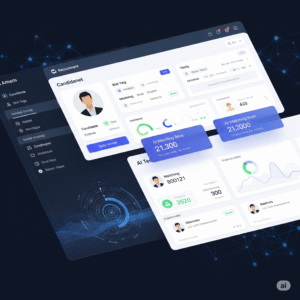For decades, the annual performance review has been a cornerstone of HR practice, intended to assess employee contributions, identify areas for growth, and inform compensation decisions. However, traditional performance management processes are often criticized for being subjective, time-consuming, and ultimately, ineffective at driving meaningful improvement. Biases can creep in, feedback can feel generic and detached, and the backward-looking nature of annual reviews often misses crucial opportunities for real-time coaching and development. Fortunately, a new era of performance management is dawning, powered by the transformative capabilities of Artificial Intelligence. AI performance management is no longer a futuristic notion but a tangible reality, enabling organizations to conduct more objective evaluations, deliver personalized and timely feedback, and cultivate a culture of continuous growth.
The integration of AI performance management tools is helping businesses move beyond the limitations of traditional methods. By leveraging data analytics, natural language processing (NLP), and machine learning, AI can provide a more holistic and unbiased view of employee performance. This isn’t about replacing human judgment entirely, but rather augmenting it with data-driven insights, allowing managers to make more informed decisions and engage in more impactful conversations with their teams. The strategic deployment of employee evaluation AI is transforming how organizations understand and nurture their talent.
From analyzing communication patterns and project contributions to identifying skill gaps and predicting future performance trends, AI offers a powerful lens through which to assess employee value and potential. This shift towards objective, data-informed evaluations fosters greater fairness and transparency within the organization, ultimately leading to increased employee trust and engagement.
The Power of Data-Driven Insights in Performance Evaluation
One of the most significant advantages of AI performance management is its ability to analyze vast amounts of data from various sources to create a comprehensive picture of an employee’s performance. Unlike traditional reviews that often rely on a manager’s memory of the past year, AI can process information from project management systems, CRM platforms, communication logs, and even 360-degree feedback tools to identify trends and patterns that might otherwise go unnoticed.
For instance, AI algorithms can analyze the frequency and sentiment of an employee’s contributions to team projects, providing insights into their level of collaboration and engagement. By tracking progress against specific goals and key performance indicators (KPIs) in real-time, AI can offer a more dynamic and accurate assessment of an employee’s impact. This data-driven approach helps to mitigate unconscious biases that can inadvertently influence human evaluations, leading to more equitable and objective assessments. The application of employee evaluation AI ensures that performance reviews are grounded in concrete evidence rather than solely on subjective perceptions.
Furthermore, AI can identify skill gaps across the organization and at the individual level, informing targeted development plans. By analyzing the skills required for current and future roles, and comparing them to the existing skill sets of employees, AI can recommend specific training programs, mentorship opportunities, or internal projects that will help individuals grow and contribute more effectively. This proactive approach to development not only benefits the employee but also strengthens the overall capabilities of the organization.
Delivering Timely and Actionable Feedback with AI Assistance
Timely and constructive feedback is crucial for employee growth and development, yet it’s often a challenge to provide consistently within traditional performance management cycles. AI performance management tools can help bridge this gap by providing managers with real-time insights and prompts to deliver more frequent and relevant feedback.
NLP-powered tools can analyze employee communication (e.g., emails, meeting transcripts) to identify opportunities for positive reinforcement or constructive coaching. For example, if an AI system detects that an employee consistently demonstrates strong problem-solving skills in their communications, it can prompt their manager to acknowledge and praise this behavior. Conversely, if an employee is struggling with a particular aspect of a project, AI can flag this and suggest resources or strategies to help them improve. This continuous feedback loop, facilitated by AI performance management, fosters a culture of ongoing development and helps employees stay on track to achieve their goals.
Moreover, AI can help personalize feedback delivery. By analyzing an employee’s communication style and preferences, AI can suggest the most effective way for a manager to frame their feedback, ensuring that it is received openly and constructively. This personalized approach enhances the impact of feedback and strengthens the manager-employee relationship.
Case Study: Enhancing Feedback at InnovateSoft Solutions
InnovateSoft Solutions, a software development company, implemented an AI performance management platform that integrated with their project management and communication tools. The AI analyzed code contributions, project timelines, and team communication to provide managers with weekly insights into their team members’ performance.
Managers received automated prompts suggesting specific areas to provide feedback on, along with data points to support their observations. For instance, if an engineer consistently delivered high-quality code ahead of schedule, the AI would prompt the manager to acknowledge their efficiency and technical skills. If another engineer was struggling with a particular coding challenge, the AI would suggest relevant learning resources and encourage the manager to offer support. This data-driven and timely feedback, enabled by employee evaluation AI, led to a significant improvement in code quality and team productivity within six months.
Streamlining the Performance Review Process with AI Automation
The administrative burden associated with traditional performance reviews can be significant, consuming valuable time for both managers and HR professionals. AI performance management offers powerful automation capabilities that can streamline various aspects of the review process, freeing up human resources for more strategic activities.
AI-powered tools can automate goal setting and tracking, making it easier for employees to align their objectives with organizational priorities and for managers to monitor progress. They can also facilitate 360-degree feedback collection and analysis, gathering input from peers, subordinates, and clients more efficiently. Furthermore, AI can assist in generating initial drafts of performance review documents based on the data collected, saving managers considerable time and effort.
By automating these routine tasks, AI performance management allows HR and managers to focus on more meaningful aspects of the process, such as providing thoughtful feedback, engaging in development discussions, and fostering a positive and growth-oriented work environment. This increased efficiency and focus on human interaction ultimately enhances the overall effectiveness of performance management.
Overcoming Challenges and Ethical Considerations in AI Performance Management
While the benefits of AI performance management are significant, it’s crucial to acknowledge potential challenges and ethical considerations. Ensuring data privacy and security is paramount, as performance data is often sensitive. Organizations must implement robust safeguards to protect employee information and comply with relevant regulations.
Another key consideration is mitigating algorithmic bias. AI models are trained on data, and if that data reflects existing biases, the AI system may perpetuate or even amplify those biases in its evaluations. It’s essential to carefully select and audit AI tools, and to ensure that the data used for training is diverse and representative. Human oversight and review of AI-generated insights are crucial to identify and address any potential biases.
Transparency and explainability are also important. Employees should understand how AI is being used in the performance management process and have access to the data that informs their evaluations. Clear communication and opportunities for employees to provide feedback on the AI system can help build trust and acceptance.
Implementing AI for Performance Management: A Practical Guide
Adopting AI performance management doesn’t have to be an overwhelming undertaking. Here’s a practical guide to help organizations get started:
- Identify Specific Needs: Determine the key pain points in your current performance management process. Are you struggling with subjectivity? Lack of timely feedback? Administrative burden? Focusing on specific needs will help you select the right AI solutions.
- Explore Available AI Tools: Research different employee evaluation AI platforms and tools that address your identified needs. Consider factors such as features, integration capabilities, ease of use, and cost. Some examples include:
- Betterworks (https://www.betterworks.com/): Offers continuous performance management with goal setting, feedback, and development planning features powered by AI insights.
- Lattice (https://lattice.com/): Provides a comprehensive performance management suite with features for reviews, feedback, goals, and employee engagement, incorporating AI-driven analytics.
- Leapsome (https://www.leapsome.com/): Focuses on performance reviews, 360 feedback, learning, and engagement surveys, with AI features to support objective evaluations and personalized development.
- Pilot and Iterate: Begin with a pilot program in a specific department or team to test the chosen AI tool and gather feedback. This allows you to identify any issues and refine your implementation strategy before a full rollout.
- Train Managers and Employees: Provide comprehensive training to managers and employees on how to use the new AI-powered performance management system and understand its benefits. Emphasize the importance of human judgment and the role of AI as a supportive tool.
- Monitor and Evaluate: Continuously monitor the impact of AI performance management on key metrics such as employee engagement, performance improvement, and retention. Gather feedback from users and iterate on your approach as needed. Utilizing data visualization tools like Google Data Studio (https://datastudio.google.com/) can help track these metrics effectively.
The Future of Performance: Empowered by AI
AI performance management represents a significant step forward in how organizations evaluate and develop their talent. By leveraging the power of data and automation, AI enables more objective evaluations, delivers timely and personalized feedback, and streamlines the overall performance management process. While ethical considerations and the need for human oversight are crucial, the potential of AI to create a more fair, transparent, and growth-oriented performance management system is undeniable. Organizations that embrace employee evaluation AI are well-positioned to unlock the full potential of their workforce and thrive in the future of work. As technology continues to evolve, AI performance management will undoubtedly play an increasingly vital role in shaping a more effective and human-centric approach to talent development.
The Future of AI Employee Experience: From Onboarding to Retention
Personalizing Employee Experience with AI: From Onboarding to Retention



